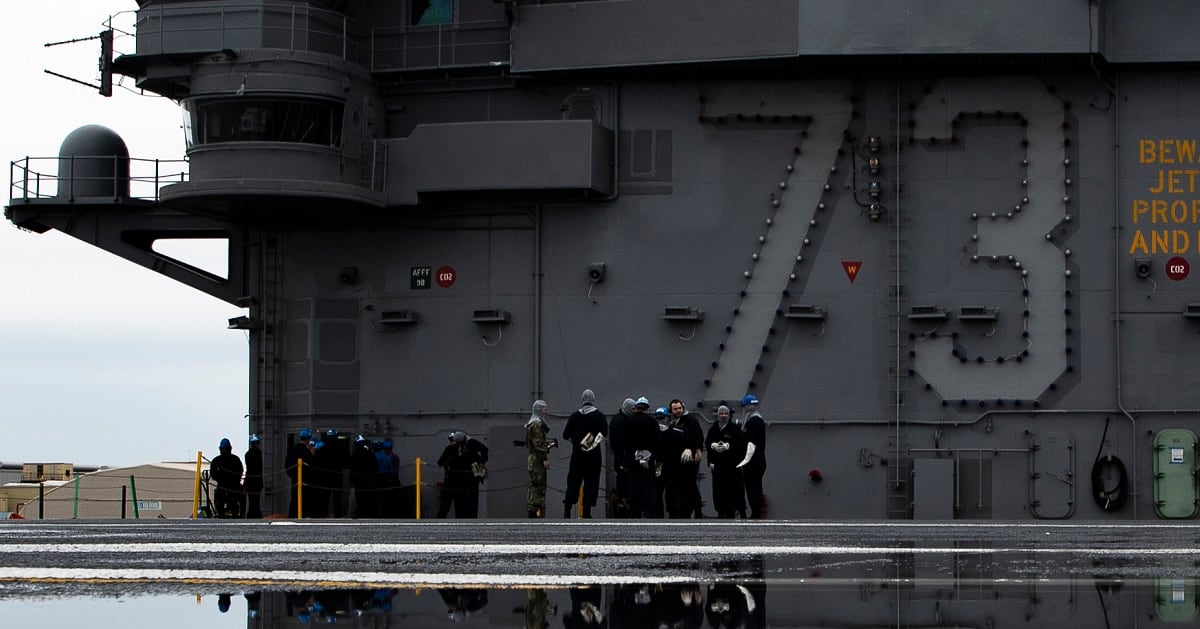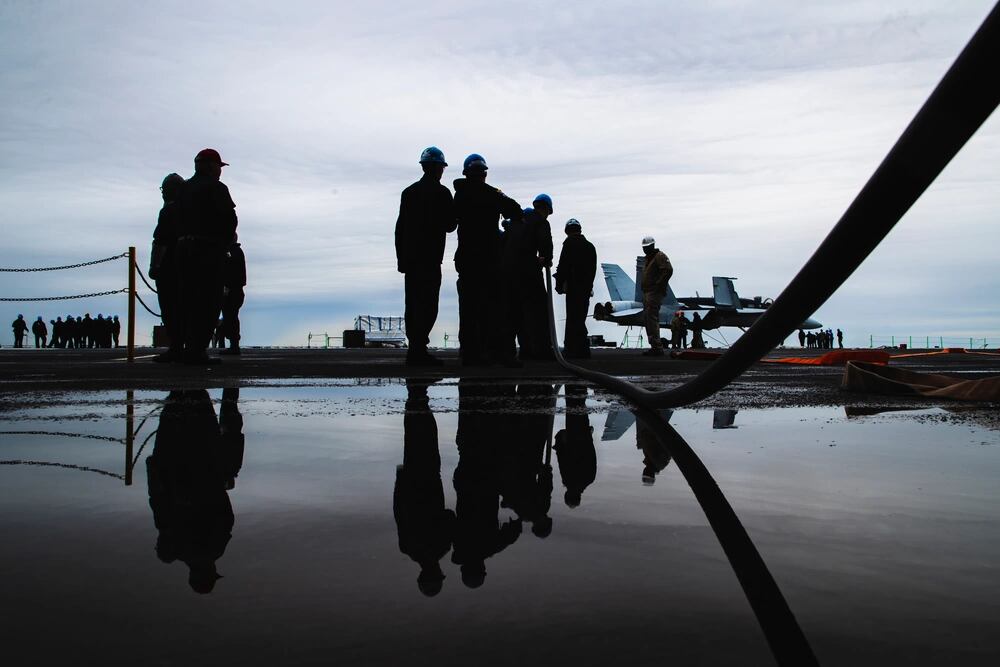A lawsuit filed by the survivors of a sailor who died by suicide aboard the aircraft carrier George Washington alleges that the Navy and Huntington Ingalls Industries failed to provide adequate living conditions aboard the ship.
Master-at-Arms Seaman Recruit Xavier Mitchell-Sandor is one of at least three sailors that died by suicide aboard the carrier in April 2022 as the ship underwent an extensive maintenance overhaul.
Mitchell-Sandor’s father, Janos Sandor, filed the lawsuit in March against the U.S. government, Huntington Ingalls Industries Inc., and Huntington Ingalls Incorporated. Sandor is seeking compensatory damages of $60 million.
The lawsuit alleges that the Navy and HII neglected to provide Mitchell-Sandor “with basic necessities of daily living required to maintain his physical and mental health while engaged in activities that were not incident to military service.”
However, HII filed a motion to dismiss the case in May, due to a lack of jurisdiction since it was filed in Connecticut, and both Huntington Ingalls Industries Inc., and Huntington Ingalls Incorporated are headquartered in Virginia.
Additionally, HII states in court filings that there is insufficient evidence demonstrating that HII “owed Mr. Mitchell-Sandor a duty to prevent his suicide or to protect him from his decision to end his life,” since the Navy employed him.
Mitchell-Sandor, 19, enlisted in the Navy in August 2021 and joined the crew of the George Washington in January 2022. The carrier at the time was still undergoing its mid-life refueling and complex overhaul, known as an RCOH, at Newport News Shipbuilding, which kicked off in August 2017 and lasted almost two years longer than expected.
RELATED

The complaint contends that the contract between the Navy and HII specified that HII was obligated to provide “living accommodations and all related services for workers on and around the vessel as there were no adequate living quarters or food services available within the aircraft carrier because it was undergoing major reconstruction.”
Repairs were conducted constantly and the commanding officer ordered the crew to live onboard, with designated quiet hours between 10 p.m. and 6 a.m. However, Mitchell-Sandor stood watch during those hours and could not sleep then, the lawsuit alleges.
“The GW presented a hazardous and noisy industrial environment, not suitable for living,” the complaint alleges. “The work required for the RCOH caused loud noises throughout the day, such as needle gunning, bells, frequent announcements and grinding.”
“While Xavier was required to stand guard during the overnight shift, the ship was quiet,” it continues. “However, during the hours he was off and required to rest and sleep, there was continuous noise on board. Because of this, Xavier could not sleep and became severely sleep deprived.”
As a result, the complaint alleges that Mitchell-Sandor often slept in his car – in a lot that was a mile walk from the ship.
Additionally, the complaint alleges that electricity, heating, ventilation, air conditioning and hot water aboard the ship were regularly shut off – and without warning. These outages lasted between several hours or up to two weeks, according to the lawsuit.
“Recreational activities, such as television and internet, were not available onboard,” the lawsuit states.
The lawsuit further alleges that Mitchell-Sandor and other sailors were afraid to report the conditions due to concerns that “they would be bullied and hazed.”
“Xavier was bullied after his family made complaints regarding the living conditions onboard,” the lawsuit said.
Mitchell-Sandor did not receive mental health care due to wait times spanning up to two months for an initial assessment and because the Navy “stigmatized” such treatment – jeopardizing sailor’s future careers, according to the lawsuit.
“Xavier grew increasingly depressed and suicidal due to the conditions onboard the GW, something he shared with shipmates and colleagues, as well as family and friends,” the lawsuit alleges.
Mitchell-Sandor died by suicide on April 15, 2022 aboard the aircraft carrier, and used his Navy-issued pistol. He claimed the living conditions he faced were the reason for his death, the complaint states.
RELATED

HII declined to comment on the particulars of the case, but a company spokesperson said in a statement to Navy Times that “our thoughts remain with Seaman Sandor’s family and his shipmates, and our shipbuilders, as we expressed at his passing.”
“We at HII work side-by-side with our U.S. Navy teammates, and we prioritize their safety – and that of our own employees and visitors to our shipyards – as we strive every day to advance the national security mission of our customers,” the spokesperson said.
Bob Reardon, an attorney representing Sandor, said that joining the Navy turned out much differently for young sailors like Mitchell-Sandor, who were completing their first assignment aboard the GW.
“They didn’t expect to be guarding a dry docked aircraft carrier all night long alone,” Reardon told Navy Times. “They expected to be providing service to the United States of America, and what they did wasn’t more than walk around in the middle of the night and guard, and did not have housing to protect them, and were told to sleep in this barren, under reconstruction aircraft carrier.”
“Totally unacceptable conduct on the part of the government and HII, for which we believe they should be held liable,” Reardon said.
The Navy declined comment, citing the ongoing nature of the case.
A total of 41 sailors died by suicide in 2023 – a drop from the 70 that died in 2022 and the 59 that died in 2021, according to the service.
Subsequent investigations the Navy conducted after their deaths determined GW sailors were subjected to conditions that negatively impacted their wellbeing.
An investigation released in December 2022 concluded the April suicides aboard the GW were not related, yet also shed insight into the challenging work environment of the yard and its taxing effect upon sailors.
For example, the investigation claimed the ship’s psychologist and behavioral health technician were “overwhelmed” and sailors seeking help were subjected to wait between four to six weeks for initial appointments.
The Navy also released a separate quality-of-life investigation in May 2023, which found that there were too few supervisors to oversee appropriate training, mentorship, and quality of life oversight for sailors. Additionally, it determined that sailors dealt with “disjointed and dispersed parking” with “episodic shuttle transportation,” as well as lengthy walks between the shipyard and the carrier.
That investigation included nearly 50 recommendations to enhance mental health resources, improve parking options and other basic amenities in the yards.
Additionally, Secretary of the Navy Carlos Del Toro and then-Chief of Naval Operations Adm. Michael Gilday stood up a team in May 2023 to create various standards for quality of life at Newport News Shipbuilding.
That team told reporters in November that sailors now have housing options off-site, updated housing and recreational buildings, access to healthy food options within 20 minutes of their living and working facilities, as well as additional health-care and Wi-Fi access.
Other reforms include the introduction of the Mental Health Playbook in February 2023, which attempts to advance mental health conversations between commanders and their sailors.
The playbook provides guidance to leaders to assist their sailors in receiving proper care, and includes instructions to help connect sailors with nonclinical mental health resources amid a nationwide shortage of mental health professionals.
Troops and veterans experiencing a mental health emergency can call 988 and select option 1 to speak with a VA staffer. Veterans, troops or their family members can also text 838255 or visit VeteransCrisisLine.net for assistance.





